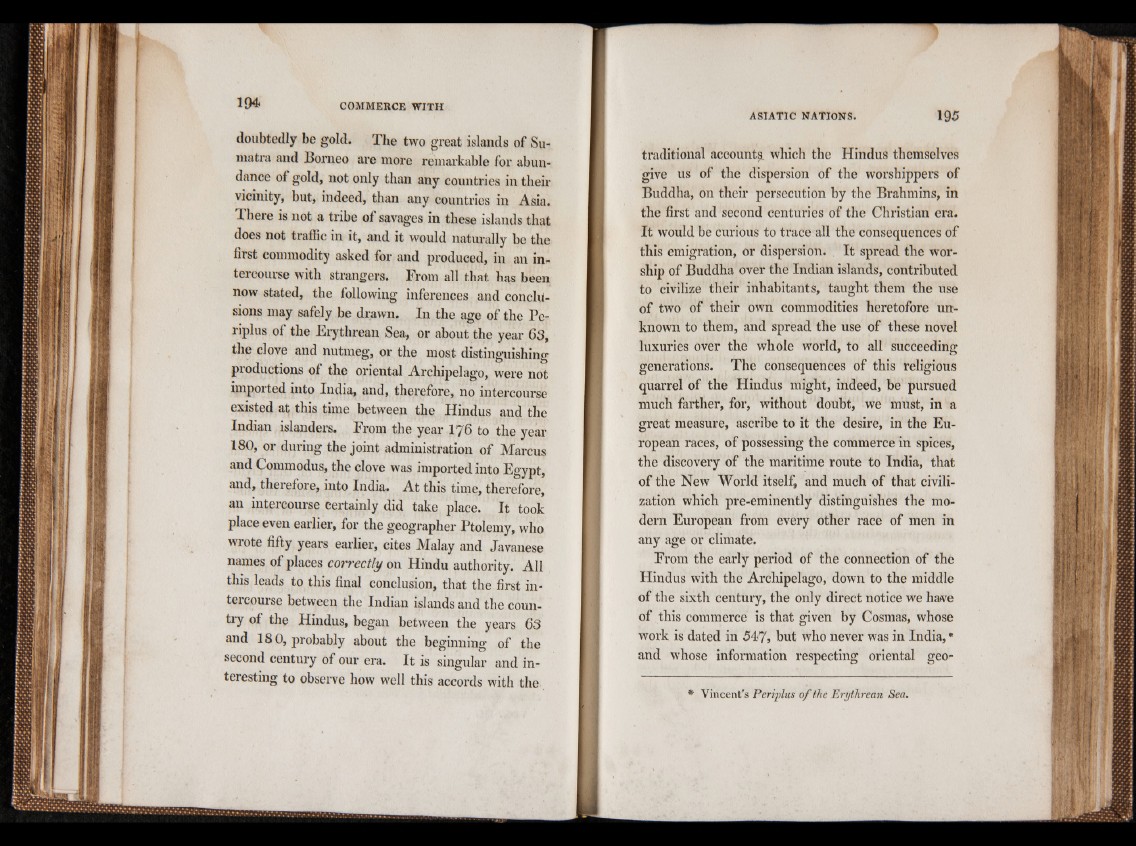
doubtedly be gold. The two great islands of Sumatra
and Borneo are more remarkable for abundance
of gold, not only than any countries in their
vicinity, but, indeed, than any countries in Asia.
There is not a tribe of savages in these islands that
does not traffic in it, and it would naturally be the
first commodity asked for and produced, in an intercourse
with strangers. From all that has been
now stated, the following inferences and conclusions
may safely be drawn. In the age of the Pe-
riplus of the Erythrean Sea, or about the year 63,
the clove and nutmeg, or the most distinguishing
productions of the oriental Archipelago, were not
imported into India, and, therefore, no intercourse
existed at this time between the Hindus and the
Indian islanders. From the year I76 to the year
180, or during the joint administration of Marcus
and Commodus, the clove was imported into Egypt,
and, therefore, into India. At this time, therefore,
an intercourse certainly did take place. It took
place even earlier, for the geographer Ptolemy, who
wrote fifty years earlier, cites Malay and Javanese
names of places correctly on Hindu authority. All
this leads to this final conclusion, that the first intercourse
between the Indian islands and the country
of the Hindus, began between the years 63
and 180, probably about the beginning of the
second century of our era. It is singular and interesting
to observe how well this accords with the
traditional account^, which the Hindus themselves
give us of the dispersion of the worshippers of
Buddha, on their persecution by the Brahmins, in
the first and second centuries of the Christian era.
It would be curious to trace all the consequences of
this emigration, or dispersion. It spread the worship
of Buddha over the Indian islands, contributed
to civilize their inhabitants, taught them the use
of two of their own commodities heretofore unknown
to them, and spread the use of these novel
luxuries over the whole world, to all succeeding
generations. The consequences of this religious
quarrel of the Hindus might, indeed, be pursued
much farther, for, without doubt, we must, in a
great measure, ascribe to it the desire, in the European
races, of possessing the commerce in spices,
the discovery of the maritime route to India, that
of the New World itself, and much of that civilization
which pre-eminently distinguishes the modern
European from every other race of men in
any age or climate.
From the early period of the connection of the
Hindus with the Archipelago, down to the middle
of the sixth century, the only direct notice we have
of this commerce is that given by Cosmas, whose
work is dated in 547, but who never was in India, •
and whose information respecting oriental geo*
Vincent's Periplus of the Erythrean Sea.